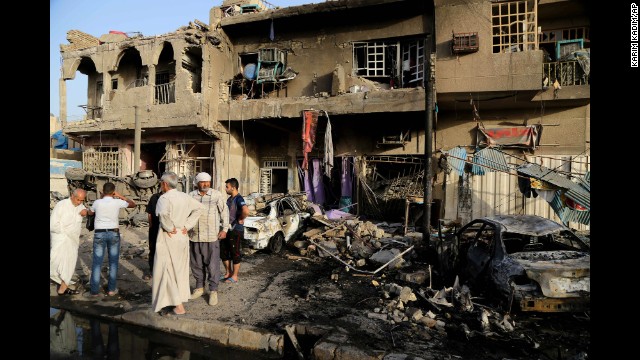Oct 03, 2014
An Afghan miracle, CNN.com
An Afghan miracle
By Peter Bergen
updated 2:12 PM EDT, Thu October 2, 2014
 People inspect the site of a double car bombing in Baghdad on Wednesday, October 1. The United Nations said Wednesday that at least 1,119 Iraqis were killed in September in acts of terrorism and violence.
People inspect the site of a double car bombing in Baghdad on Wednesday, October 1. The United Nations said Wednesday that at least 1,119 Iraqis were killed in September in acts of terrorism and violence.
STORY HIGHLIGHTS
- Amid all the bad news, there's a sign of progress in Afghanistan, says Peter Bergen
- Bergen: A national unity government has agreed to a continuing U.S. presence
- He says Afghan leaders are making calls opposite to what Iraq's al-Maliki did
- Bergen: Afghanistan's economy could benefit from signs of greater stability
The Afghans have done exactly what the feckless and irresponsible Iraqi government failed to do during the past several years. Peter Bergen
What makes this all the more important is that Ghani is identified with the Pashtuns, the largest ethnic group in Afghanistan, while Abdullah is identified with the sizable Tajik ethnic group. This is precisely the opposite of what the government of Nuri al-Maliki did in Iraq, which ruled as a Shia chauvinist party and excluded Sunnis from positions of any power or influence. Tuesday, the day after Ghani and Abdullah were inaugurated, they signed the Bilateral Security Agreement, which allows 9,800 American troops to remain in Afghanistan after NATO combat operations cease at the end of December. Again, this is exactly the opposite of what happened in Iraq where the Iraqis would not sign a similar basing agreement with the United States. As a result, almost all American troops left the country in December 2011. The result of Maliki's decision to exclude the Sunnis from any form of power meant that many Sunnis passively or actively supported ISIS, which is now almost at the gates of Baghdad. And, largely as a result of the rise of ISIS, more than 5,500 Iraqi civilians have been killed in the renewed Iraqi civil war between January and June, according to the U.N. By contrast, 3,000 civilians were killed in the Afghan War in 2013. Afghanistan and Iraq have roughly the same size populations, which therefore makes Iraq today about four times more violent than Afghanistan. The signing of the Bilateral Security Agreement (BSA) is important not only because it allows thousands of American soldiers to remain in Afghanistan as well as a smaller number of troops from other NATO countries, but also because it will restore the confidence of the business community in Afghanistan. Former Afghan President Hamid Karzai's stubborn refusal to sign the BSA for many months had contributed to an atmosphere of uncertainty in the country, which had damaged the Afghan economy significantly. That will change now. What would make the situation in Afghanistan change even more for the better is if the leading contenders in the American presidential race added into their platforms a pledge to extend the U.S. military presence in Afghanistan past December 2016. President Obama's decision to pull out all American troops from Afghanistan two years from now does not bind whoever wins the 2016 presidential campaign. After all, at considerable U.S. and Afghan government effort, a Strategic Partnership Agreement has already been negotiated between the two countries that runs until at least 2024 and that would easily provide the basis for a longer term troop commitment. Many Afghans wants some kind of long-term American military presence in their country as a guarantor of their stability. They only need to look at the carnage in Iraq to remind themselves that the model they want to emulate is South Korea with its decades-long U.S. military presence, not Iraq. At the end of the Korean war in 1953 South Korea was one of the poorest countries in the world; now, under an American security umbrella, it is one of the richest. And the appearance of ISIS-like Taliban militias in Afghanistan over the past week who have beheaded 15 Afghan civilians is a reminder to Afghan and Americans and alike that they have a long-term strategic interest in preventing Afghanistan from becoming a safe haven for terrorists again.
FEATURED BOOK

